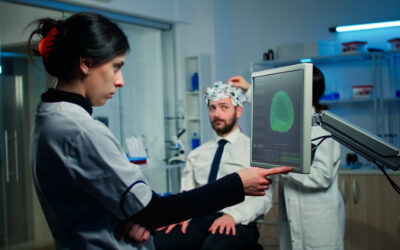“The important thing is not whether machines will be more intelligent, but that we protect what makes us human.”
“Perhaps Homo sapiens is just a chapter in the history of the planet”
Although Howard Gardner is not one of our usual thinkers nor a frequent guest, he gave an interview to XL, through Carlos Manuel Sánchez, where “the father of multiple intelligences” discusses artificial intelligence, and his concepts are of particular importance to us.
This Harvard professor revolutionized the world of education with his idea of multiple intelligences: our mind is so complex that it cannot be reduced to a number on an IQ test. Now that artificial intelligence has emerged, he predicts the arrival of a new species: the posthumans. “Perhaps Homo sapiens,” he says, “is just a chapter in the history of the planet.”
Howard Gardner was born in Scranton, Pennsylvania, in 1943, into a family of Jewish refugees who had fled Nazi Germany. At Harvard, where he has developed his career since 1961, he holds the John H. and Elisabeth A. Hobbs Chair in Cognition and Education. He is also one of the founders of The Good Project, dedicated to promoting ethical excellence in education and work.
Gardner, considered the most influential psychologist specializing in education in the world, caused a stir in 1983 with a revolutionary idea: there is not just one intelligence, but many different forms of being intelligent. Traditionally, intelligence was measured with a single test, the IQ test: if you scored over 120, you were a genius; the average was 100; and if you scored under 80, you needed help. Gardner identified seven distinct types of intelligence: linguistic and logical-mathematical (the only ones measured by the IQ test), but also musical, spatial, bodily-kinesthetic (agility), interpersonal (relating to others), and intrapersonal (understanding oneself). Years later, he would add an eighth: naturalistic (an interest in nature).
“Curriculums must dedicate much more time to the humanities. This will help ensure that what comes next is not built on our worst tendencies.”
His theory of multiple intelligences caused a rift. Many psychologists and old-school educators tried to dismantle it. But thousands of teachers on the ground understood its potential, and millions of students benefited: suddenly, that girl who didn’t stand out in math but had a gift for organizing her classmates had “high interpersonal intelligence.” Or that boy who failed in syntactic analysis but spent hours observing insects was no longer condemned to academic failure, but was seen as a potential biologist. The question was no longer “who is the smartest?” but “what does each child excel in?”
Being a reference at Harvard helped Gardner withstand the storm. When his colleague Daniel Goleman popularized the concept of ’emotional intelligence,’ it became clear that human intelligence was too complex to be captured by a simple number. Now, as artificial intelligence shakes our world, Gardner’s ideas gain renewed relevance. The veteran professor wonders if human and computational intelligence will be able to work together productively, or if they will instead create chaos. “After all, if a conflict were to arise between Homo sapiens and General Artificial Intelligence, which entity would have the authority or capability to mediate in that dispute?” he warns.
XL: Human intelligence is no longer alone, but we’re not sure if AI is a competitor or an ally. What’s your take?
Howard Gardner: The first thing is that we need to rethink how we use the word ‘intelligence.’ The arrival of AI is as significant as the invention of the alphabet or the printing press. However, humans have never been the only intelligent species on this planet. We must consider animal intelligence, perhaps even that of some plants. And now, certainly, the computational intelligence demonstrated by these large language models like ChatGPT.
XL: These models already surpass us in many aspects…
H.G.: That doesn’t matter. We still play chess, even though computers easily defeat us. The important thing is not whether machines surpass us, but understanding what our unique capabilities are as human beings. And protecting them!
“Times are tumultuous, requiring extra effort. We must develop critical thinking. If that means limiting access to mobile phones at early ages, I am in favor.”
XL. But if a superintelligence eventually comes and surpasses us in everything, aren’t we heading towards irrelevance?
H.G. That will only happen if we allow it. It’s not a technological problem, but a decision we must make as a society: do we want to use AI to enhance human capabilities or to avoid our responsibilities and let it make decisions for us?
XL. Let’s assume the best-case scenario, and that many humans use it for their benefit. Wouldn’t we need to revise your theory of multiple intelligences and add the talent to take advantage of AI?
H.G. Yes. We are analyzing what collaborative intelligence between species would look like. It is very likely that the future will lead us to consider ‘combinations of intelligences,’ where human and computational abilities intertwine and enhance each other. Moreover, these systems will become increasingly intelligent. They will have capabilities we cannot even imagine. Sooner or later, hybrid systems will likely develop—language models fused with organic tissue, or human brains with neural network implants.
XL. In that case, isn’t the very concept of humanity at stake?
H.G. Perhaps Homo sapiens is just a chapter in the planet’s history and a sentence in the history of the universe. And that the transition to a posthuman future will involve the integration of technology into our bodies and minds. The challenge is to ensure that this transformation is positive for all of humanity and that it preserves the values we consider essential.
XL. I’m afraid it will be hard to agree. There are human rights: indisputable in theory, but then in practice…
H.G. As a species, we are capable of both the best and the worst. But we must not underestimate the fact that we didn’t just create the first musical instruments: Bach composed exquisite cello suites, and Yo-Yo Ma can perform them brilliantly. Curriculums should dedicate much more time to the humanities: to teach what makes us human, what we’ve achieved, our wonderful creations. It would help ensure that the foundations of what comes next are built on our best accomplishments, not our worst tendencies.
XL. And what comes next?
H.G. Let’s be realistic: we are not the glorious culmination of evolution. From science and medicine, we can already alter the genome, improve or eliminate traits, create new ones. From technology, we can create entities that will far surpass us. That doesn’t mean we are going to go extinct. Though it doesn’t guarantee that posthumans will be our direct descendants either. We’d like to be able to recognize ourselves in them, but we don’t know if we will still be ‘us.’
XL. Before that scenario arrives, aren’t you worried that we will use AI like someone invoking the genie from the lamp and end up becoming complacent?
H.G. Of course. Only an ostrich would stick its head in the sand and leave all thinking to machines. We need to educate future generations on how algorithms truly work, so they are not misled by their products and recommendations, and so they know when to moderate their use or even do without them.
XL. That increasingly powerful AI will coexist with several generations that don’t even fact-check what it says, as if they don’t care whether it’s wrong or lying…
H.G. The root of the problem lies in a misguided use of technology, turning it into a substitute for human experience. When asked to list the most important events of their lives, many young people don’t mention political, economic, or cultural events; only social media. Because they lack that real experience… They expect life to work like a phone app—quick and efficient, telling them what to do and how to feel. But life doesn’t work that way. There are always accidents, losses… And overcoming disappointments is what makes life worthwhile.
XL. However, despite being digital natives, they don’t seem very prepared to avoid falling for fake news…
H.G. Well, we need to roll up our sleeves! Not just young people. I include myself. Just because there is a lot of misinformation out there doesn’t mean we should get discouraged or give up. These are tumultuous times that demand extra effort. From all of us.
XL. And what can we do?
H.G. Help them develop their creative muscles, their critical thinking. The mind also needs to go to the gym. If that means limiting access to phones, especially at early ages, I’m in favor of doing that. Australia has just passed such legislation. But the adults around them must do the same. Children never listen to what you say, but they always watch what you do… and what you don’t do.
XL. When a child can instantly generate an image or correct their writing with a click, don’t we lose something essential in learning?
H.G. Only if we allow children to become dependent on applications; then they will take the easy route. But look at it from another perspective: in the 16th century, only a few educated individuals in Europe had the potential to become Leonardo da Vinci or Michelangelo. Today, millions have the option to be Leonardo if they choose to seize it… The question is how we use these tools to expand their creativity and curiosity, not to limit them.
“Claiming that a device is ethical is a conceptual mistake. Ethics requires debate in a community, principles… Machines will be intelligent, but not wise.”
XL. And who will teach them, the machines themselves? Are we going to raise them with robots?
H.G. Oh, please! I prefer human beings made of flesh and blood who love children. Humans learn primarily from other humans, even if they are imperfect. That’s what religion, literature, and art have done for a long time. That’s what the figures who inspire us do.
XL. Today, the ones who inspire (or should inspire) are the influencers…
H.G. Yes, to the detriment of true mentors. A mentor exerts an influence that is long-lasting and personal, face to face. It’s not something that can be shared among thousands or millions of followers on social media. And a mentor does not seek to have more followers, a mentor tries to be an example and do what’s right.
XL. Is it impossible to use TikTok for education?
H.G. I’m not saying that… Students need guidance from good influences who use their talents and platforms constructively. What I miss are figures that inspire us even if they’re no longer with us. I think of Gandhi, Nelson Mandela, Mother Teresa… But who do we have today? Elon Musk… No one should think that Musk is the most important person on the planet, because he is not.
XL. There was a time when Silicon Valley was a source of inspiration…
H.G. That’s true. Even Steve Jobs, who was one of the ones who brought us all of this, was a person with concerns that went beyond making money. There was his interest in spirituality, his search to find his own path, his appreciation of beauty.
“My grandchildren have been told not to forget that we are fragile. Totalitarianism, climate, violence… Without a planet, discussions about intelligence will be irrelevant.”
XL. Isn’t Silicon Valley imposing its agenda, whether we like it or not?
H.G. The course of history cannot be controlled, and we shouldn’t even try; advancements will come regardless… What’s crucial is how we respond to what’s happening, detect the risks, and face them.
XL. Do you foresee AI acquiring consciousness?
H.G. It’s too speculative a topic—how do you prove it? Computational systems could be trained to pretend to have consciousness. For humans, being conscious is the most impressive and also the most elusive of our abilities. There are reasons to believe that only in the last ten thousand years did members of our species reach the kind of consciousness and self-awareness that we take for granted today.
XL. Should we let AI make ethical decisions, decide what’s right and wrong?
H.G. “Saying that a device is ethical seems like a conceptual mistake. Ethics requires debate among humans within a community, along with appropriate principles and sanctions. We could program it to follow certain standards, but ethics involves deep questions for which there are no easy answers. That’s where human dialogue, judgment, and wisdom come into play. And machines can be intelligent, but claiming they are wise is another categorical mistake.”
XL. You have five grandchildren, are you concerned about what the future holds for them?
H.G. How could I not be? When I turned 80, I gave each one an ‘ethical will’ signed by me. I hope that long after I’m gone, they will remember our little ceremony and appreciate what their grandfather valued… even if they don’t always agree with what I thought and wrote.
XL. And what’s your message to future generations?
H.G. I want them to master new technologies, but not forget that we are a fragile species. I’m worried about the rise of fascism, totalitarianism, and anti-democratic forces around the world. If we don’t confront climate change, if we don’t control weapons, if we don’t resist violence and war, there will be no planet, and all of our discussions about education and intelligence will be irrelevant.






0 Comments